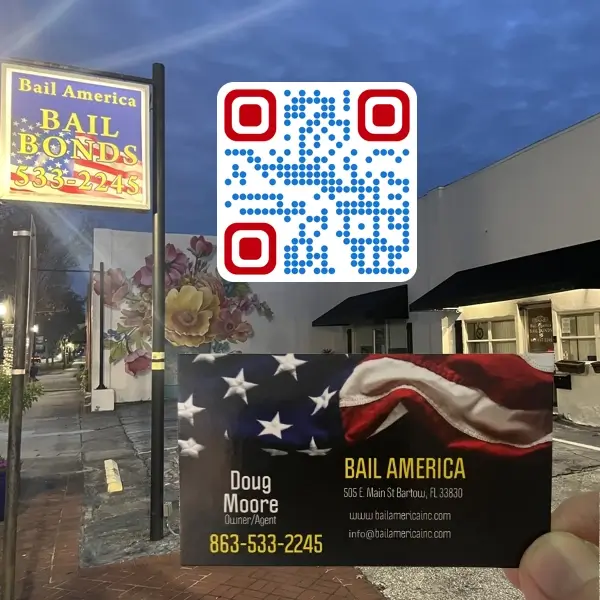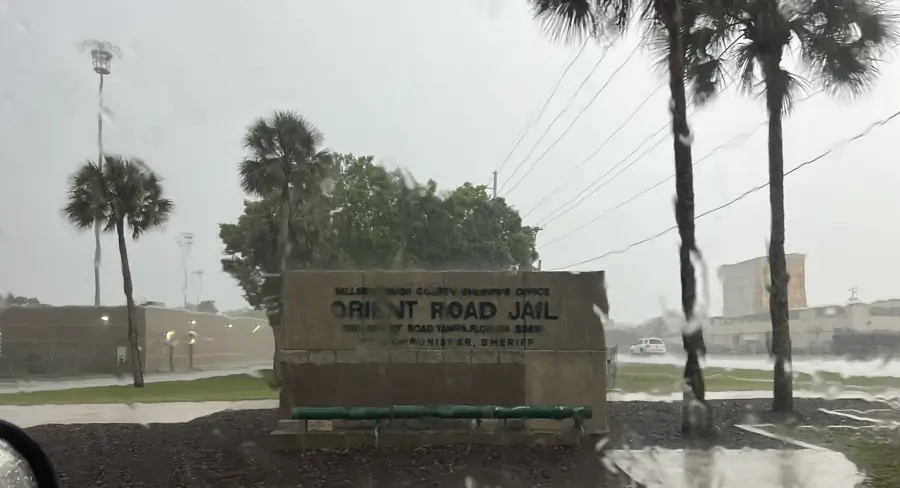Florida follows a cash bail system: When a person is arrested in Florida, they may be required to pay the full amount of bail in cash in order to be released from custody. This can be an unexpected and significant financial burden for many individuals.
Bail bonds provide an alternative option: a Florida bail bond allows defendants to pay only 10% of the total bail amount to a bail bondsman. Once the bail contract is signed, the bondsman will provide the full bail amount to the court on behalf of the defendant. This allows defendants to secure their release without having to pay the full bail amount upfront.
Bail bondsmen charge a fee for their services: In exchange for posting bail on behalf of the defendant, bail bondsmen typically charge a non-refundable fee (called the premium), usually around 10% of the total bail amount. This fee is their profit and is separate from the bail amount.
How Does Bail Work in Florida?
Bail processes in Florida are governed by court regulations and bail guidelines. Understanding how bail works in Florida is made simpler to understand in the following key points:
- Types of bonds available, such as cash bonds, signature bonds, surety bonds, and property bonds.
- The role of bail bond agents in facilitating the release of the defendant before trial.
- The determination of bail amounts by judges, taking into account the seriousness of the offense and the following factors:
- The seriousness of the crime(s) the defendant is accused of
- Prior convictions of the defendant
- Failure to appear in court for past charges
- Does releasing the defendant pose a danger to the community and especially any victims
- Does the defendant have any ties to the community (how long at the address, family in the county, etc)
- If cash bail, where did the funds come from to pay the bond?
- Mental condition of the defendant prior to release
- Conditions that may be imposed on the defendant upon their release, such as attending court hearings, no drugs or drinking, no attempts at communicating with victims and staying within a specified jurisdiction. This may include having to use an ankle monitor tracking device.
- The potential consequences of failing to comply with bail conditions or appearing for scheduled court hearings.
How Much Does Bail in Florida Cost?
Additionally, it is crucial to note that each state has its own unique bail procedures, necessitating familiarity with Florida’s specific regulations and processes. Understanding the intricacies of how bail works in Florida can help individuals navigate the legal system effectively and secure the quick release of their friends or family ones while awaiting trial.
How Do I find a Licensed Florida Bail Bondsman near me?
If you’re going to jail, there will be a list of licensed bondsman you can call and when you’re searching for bail bonds near me in Polk County, Florida – time is of the essence. If you’re the cosignor the easiest way to find a bail bondsman in Florida is to simply search the web. But How Bail Works has made it easy for you!
One of the oldest, most reliable bail companies in the Sunshine State is Bail America bail bonds service in Bartow, Florida. They’ve been in business since 2000 and can write any bond statewide.
Bail America Bail Bonds
505 E. Main St,
Bartow, FL 33830
Tel: (863) 533-2245
Web: https://bailamericainc.com
Hours: Sun – Sat 24 Hours
Map to Bail America Bail Bonds
Bail America offers the best bail bonds service throughout Polk County, Florida. Online or in person, they can write the bond to effect quick release from Polk County jail or any Florida jail 24 hours per day.

What Are Bail Bonds?
Bail bonds in Florida, often called surety bonds, serve as a financial guarantee that a defendant will appear in court for their scheduled hearings. These bonds are typically obtained through a bail bond agent who charges a nonrefundable fee, usually around 10% of the total bail amount, in exchange for posting the full bail amount on behalf of the defendant.
By using a commercial bail bond company, individuals who cannot afford to pay the full bail amount can secure their temporary release from custody. It is important to note that if the defendant fails to appear in court as required, the bail bond may be forfeited and the defendant could face re-arrest.
One unique detail about bail bonds is that they are all regulated by state laws. In Florida, for example, the Florida Department of Financial Services oversees the licensing and regulation of bail bond agents. Bail bond agents must meet certain qualifications, undergo a background check and attend classes to obtain their license. Additionally, the premium paid to a bail bond agent is nonrefundable, regardless of the outcome of the defendant’s case.
True History: Bail bonds have been a part of the legal system for centuries, dating back to medieval England. The concept about bail was introduced to ensure that individuals accused of crimes could be released from custody pending their trial, while still ensuring their appearance in court.
Florida bail bonds have evolved and become more regulated over time, but their purpose remains the same, to provide a way for defendants to secure their release while awaiting trial.
The Bail Bonds System in Florida
Once a person has been arrested and taken to jail, the processing period may 1 to 3 hours. But this time depends on the time of day, or day and how busy the jail is. Once booking is completed, the defendant will either know their bail amount or need to see a judge for a bail hearing. It’s at this point the inmate will have the option to either stay in jail or be bailed out on bond.
A defendant may pay the bond with a bail bond agent or pay the full amount of the bail in cash. There may be some jails that will accept credit cards, but the bail bond agency can start to work on the amount as soon as it is known even before the booking process is complete in some cases.
Let’s be clear, you do not want to leave someone in a jail in Florida, ever. Florida residents who need to get a defendant out of jail before their court date and can’t afford the full cash bail will require contacting a local, reputable Florida bail bonds agent.

For more information about how bail bonds work in Florida, and you want to know if the bail bondsman you’re about to sign a bail application with is legit? You can consult the Florida Office of Insurance Regulation and lookup the validity of a bail license.
Florida Bail Bonds Charges & Fees
When you post a bond with a Florida-based agent, you will be charged a percentage or premium of the total amount. The fees of the bail bond are set by the state as they are in most states, but in Florida any bond that is $1,000 or less will cost $100 while any amount above that will be 10% of the total bond. So, for a $500 bond, that will cost you $100. But for a $2,000 bond, that will cost $200 and so forth depending on the amount.
Multiple bonds mean multiple payments as in one per bond that has been issued. For example, if you have three bonds of less than $1,000 each, then you will need to pay $300. For each bond that is more than $1,000 then you will need to pay 10% of the total amount for the bond.
Multiple bonds are fairly common in Florida, which means that those who are arrested on multiple counts will need to be prepared to pay on each bond.
How do I know if I’m Eligible for a Signature Bond?
There are ways to get a signature bond if arrested in Polk County, Miami-Dade County, Hillsborough County, Broward County, Duval County or anywhere else, and here’s how:
- Hire a great Florida criminal lawyer who can argue for your immediate release.
- Prove you’re not a flight risk.
- Prove you have strong ties to the community.
- Your alleged crime cannot be violent.
- Promise to abide by all court imposed rules (no drinking, fighting, drugs, re-arrested, etc).
Some Facts About How Bail Bonds Work in Florida:
- ✅ Bail is the amount set by the court to secure pretrial release in Florida. (Source: Florida Bail Bond Laws)
- ✅ The amount of bail is determined based on factors such as the crime the defendant is accused of, past convictions, and ties to the community. (Source: Team Research)
- ✅ If the defendant fulfills all their obligations and does not violate the terms of bail, the bail money is returned after the proceedings conclude. (Source: Team Research)
- ✅ Bail bonds are an option for defendants who cannot afford bail, where a bail bond agent pays the full bail amount and the defendant pays 10% of the bail to the agent. (Source: Team Research)
- ✅ The 10% fee paid to the bail bond agent is a fee, not a deposit, and is not returned even if the charges against the defendant are dismissed. (Source: Florida Bail Bondsman Association)
FAQs about How Bail Bonds Work In Florida
How does bail work in Florida?
When arrested in Florida, you may be required to post cash bail or a bail bond before being released. The agent will pay the full bail amount on your behalf in exchange for a fee of 10%, which is non-refundable even if the charges against you are dismissed. So for example, if your bail is $10,000 you will pay the bondsman $1,000
What is the difference between cash bail and a bail bond?
Cash bail is the set amount determined by the court and you’ll need to come up with 100% to pay the court. A bail bond is an agreement with a Florida bondsman who posts bail on your behalf for a fee of 10%.
Do I get my money back if I post bail?
Yes and no. If you post a full cash bail to the courts, your bail money will be returned to you after the proceedings conclude. However, the court may use bail funds to cover fines, court costs, and restitution before returning any remaining balance. If you use a bail bondsman you will not receive your 10% premium payment as that is a fee to use the bondsman’s bond.
What are the terms of pretrial release?
If released on bail, you must comply with certain conditions which may include:
- Not engaging in criminal activity
- Refraining from contacting your alleged victim(s) if a no-contact order is in place
- No drugs or alcohol
- Checking in with a probation officer and bondsman
Plus, adhering to any additional terms set by the court.
Can the bail amount be reduced or increased?
The court has the authority to increase or reduce the amount of bail required based on various factors, including the severity of the crime, past conduct, ties to the community, financial resources, and the defendant’s risk of flight or danger to the community. This amount will be argued by your attorney at your bail hearing.
What happens if I can’t afford bail in Florida?
If you can’t afford bail, you can opt to get a bail loan if your bail bondsman is willing to work with you. You may also try to get a bank loan or personal loan. Your bail financing options are going to depend on your credit history and the credit history of the cosignor(s)
How much is a bail bond if my bail is $100,000?
If your bail is $100,000 then the amount you will pay a Florida bail bondsman is 10%, or $10,000.
| CASH BAIL AMOUNT | PREMIUM % | BAIL COST |
|---|---|---|
| $1000 | 10% | $100 |
| $5,000 | 10% | $500 |
| $10,000 | 10% | $1,000 |
| $20,000 | 10% | $2,000 |
| $50,000 | 10% | $5,000 |
| $100,000 | 10% | $10,000 |
| $150,000 | 10% | $15,000 |
| $250,000 | 10% | $25,000 |
| $500,000 | 10% | $50,000 |
| $1,000,000 | 10% | $100,000 |
Video: How Bail Bonds Work in Florida: Florida Bail Bonds Information
So how does bail bonds work in Florida? Put simply A judge will set the defendant’s bail amount. A Florida bailbond agent will write the bond once the defendants co-signor guarantees the full amount of bail to the bondsman will be paid if the defendant does not appear in court for trial. Watch the following video for for details about how bail bonds work in Florida.


